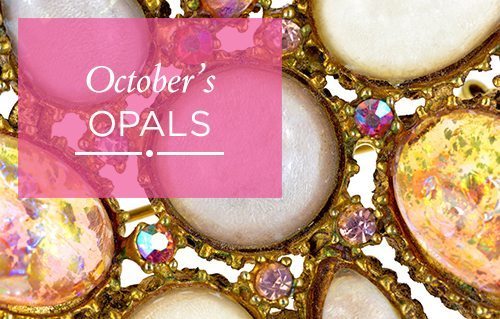Opal in October

How did those October ladies luck out with their opal birthstone? Maybe the simple alliteration of “October opals” or the stones’ multi-colored hue reminiscent of fall influenced the decision. Regardless, women around the world, whether born in October or not, seem to be falling in love again with the beautiful gemstone.
Opals have been trending, particularly with millennials, some of whom are even choosing them as engagement rings. Because each stone is unique, with hues varying from soft to vibrant, they are an apt choice for representing a once-in-a-lifetime love. They are also known as a lucky stone, and who couldn’t use a little more luck in her life? We at Shelton Jewelers dont recommend Opals in rings because they are very soft stones and are prone to damage. Earrings or a pendant would be best.
The return of opals’ popularity has been traced to Cate Blanchett’s decision to wear opal earrings to the 2014 Academy Awards. Blanchett chose the stunning Chopard cluster earrings in part because opals are “must-haves” for Australians. Ninety-five percent of the world’s opals are produced in her native Australia. Since then, designers around the world have been drawn back to opals, introducing them to a new generation.
Opals are delicate stones requiring special care and cleaning. They should be cleaned with a gentle, non-ammoniated jewelry cleaning formulation that is safe for softer stones and doublets, following the product instructions carefully. Opals are often set with glue, including in doublets, brooches, and some earrings and rings, and should not be soaked in any liquid for a prolonged period of time, which can break down the glue. Do not use an ultrasonic cleaner on opal jewelry, as the vibrations may cause the stone or glue setting to crack.
Opals also require careful storage. Because they are composed of five to ten percent water, opals will deteriorate over time as they dry out. If you do not store them properly, they can literally turn to dust. As they dry out, opals turn milky, losing their beautiful layers of color, and may crack. Once they become too dry, one can try to add moisture back, but often they cannot be repaired. That is why it is very important to store them in a cool, moist place, minimizing exposure to heat and dry environments.
Opals are sometimes stored with an open glass of water to maintain humidity; you may see jewelers using this trick inside a case of opal jewelry. When storing your own opal jewelry, place your opal in a cotton cloth or pouch with a few drops of water, then seal it in a plastic bag.
